Key takeaways:
- Homeless charity programs not only provide food and shelter but also focus on empowering individuals through job training and mentorship.
- Mentorship is vital in charities, fostering self-belief and community bonds, which enhance personal development and charity sustainability.
- Various mentorship types, including peer, professional, and group mentorship, address distinct needs and encourage shared experiences among participants.
- Participants in mentorship programs often experience transformative moments, overcoming personal challenges and discovering new passions through guidance.
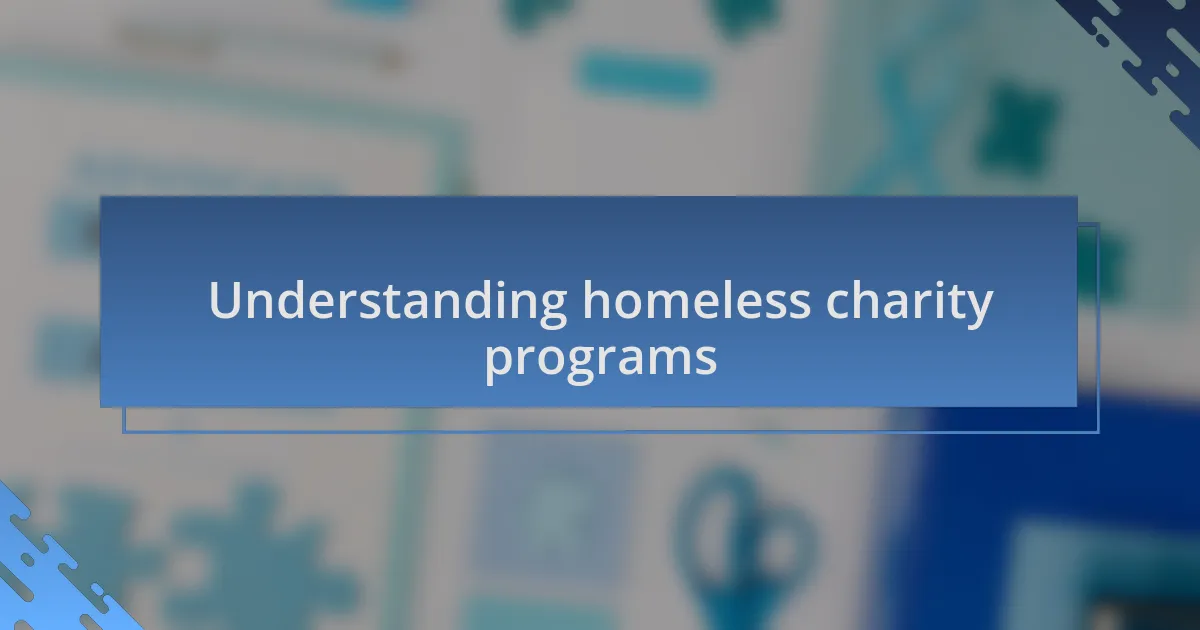
Understanding homeless charity programs
Homeless charity programs serve as lifelines for those experiencing homelessness. I remember attending a local outreach event, where I met a single mother struggling to find shelter for her children. Seeing her vulnerability really struck me; it made me appreciate how essential these programs are in providing safe havens and resources to those in need.
Many might not realize that these programs go beyond just offering food and warmth; they aim to empower individuals. For example, I once volunteered at a shelter that included job training workshops. Watching participants gain confidence and skills was a truly rewarding experience, highlighting how these initiatives can foster a sense of self-worth and hope.
It’s important to consider how we can support these initiatives effectively. Have you ever thought about the role your contribution could play in someone’s recovery journey? Personally, witnessing the positive impact of mentorship within these settings has made me want to actively engage and amplify my support for such vital programs.
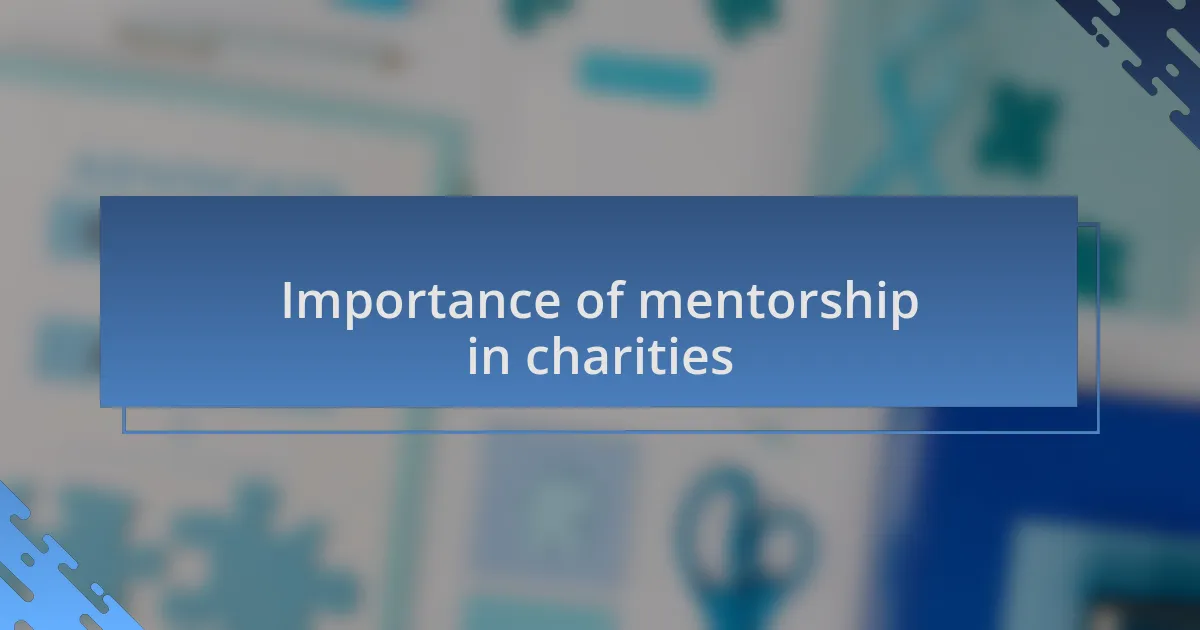
Importance of mentorship in charities
Mentorship in charities plays a critical role in transforming lives. I can recall a time when I met a mentor who had once experienced homelessness himself. His story of resilience and guidance filled me with hope, illustrating how mentorship can provide not only a roadmap but also a beacon of encouragement for those navigating their own challenges.
To me, mentorship fosters a unique bond that helps individuals believe in themselves. I once observed a mentor supporting a young man who was hesitant to pursue educational opportunities. After several sessions, I saw not just academic ambition bloom, but also a newfound trust in his potential. Isn’t it fascinating how a few encouraging words can change a life trajectory?
Moreover, mentorship cultivates community bonds that are essential for charity sustainability. I often think about the connections formed in these programs; they create a powerful support network that extends beyond individual relationships. Aren’t we all looking for that sense of belonging and guidance that helps us grow? In charities, mentorship becomes a bridge linking personal development with community upliftment, ensuring that no one walks their path alone.
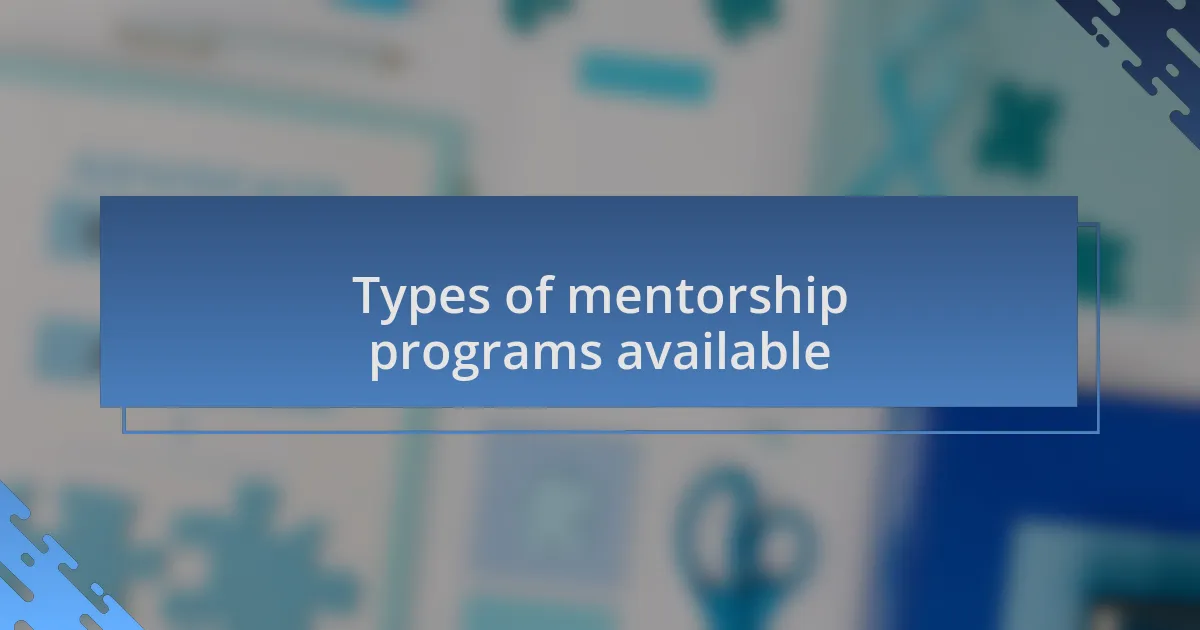
Types of mentorship programs available
Various types of mentorship programs cater to the diverse needs of individuals facing homelessness. For instance, peer mentorship pairs those currently experiencing homelessness with those who have successfully navigated similar challenges. I remember a peer mentor who shared his transition story; witnessing that firsthand connection was inspiring. It reminded me that sometimes, those who have walked the same path can provide invaluable insights into healing and growth.
Another commonly found program is professional mentorship, which focuses on guiding individuals to develop their careers or educational paths. In one initiative I observed, mentors helped mentees refine their resumes, build interviewing skills, and explore educational opportunities. It struck me how this type of mentorship not only equips individuals with tangible skills but also ignites a sense of ambition in them. Have you ever felt that spark when someone believes in your potential?
Then there are group mentorship programs that create a supportive environment where individuals can share experiences and learn collaboratively. I once participated in a group that focused on life skills; the discussions were so enriching. Seeing participants gain confidence as they shared personal stories truly highlighted how mentorship can foster collective resilience. Why is it so uplifting to share your journey with others who understand? It’s that shared vulnerability that strengthens our community.
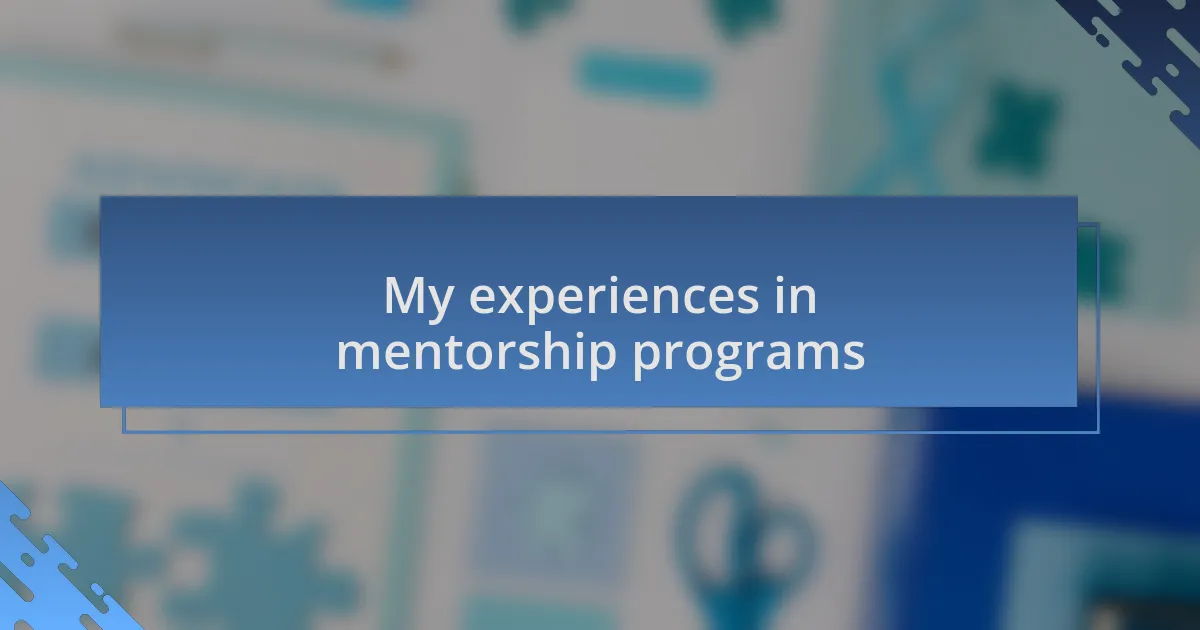
My experiences in mentorship programs
Participating in a mentorship program was a transformative experience for me. I remember a specific moment during a one-on-one meeting with my mentor, where we discussed not just goals, but also fears and dreams. It was in that intimate setting I finally articulated my aspirations—a breakthrough moment that I had been hesitant to voice before. Have you ever felt like naming your dreams out loud changed everything?
In another program, I experienced the power of storytelling firsthand. During a workshop on public speaking, my mentor encouraged me to share my journey with the group. Sharing my struggles felt daunting at first, but the collective support from everyone present gave me a new sense of confidence. It was as if each story we shared created invisible threads binding us together, weaving a tapestry of resilience. Doesn’t it feel empowering to be seen and heard?
There was a time when I joined a mentorship initiative that encouraged skill-building workshops. I took a leap of faith and signed up for coding classes. Surprisingly, my mentor guided me through complex concepts with patience, breaking them down into digestible pieces. Through his encouragement, I developed a passion for technology that I never knew I had. What about you? Have you ever discovered an unexpected talent through guidance? These experiences have shown me that mentorship is more than advice; it’s about unlocking potential and igniting passions.
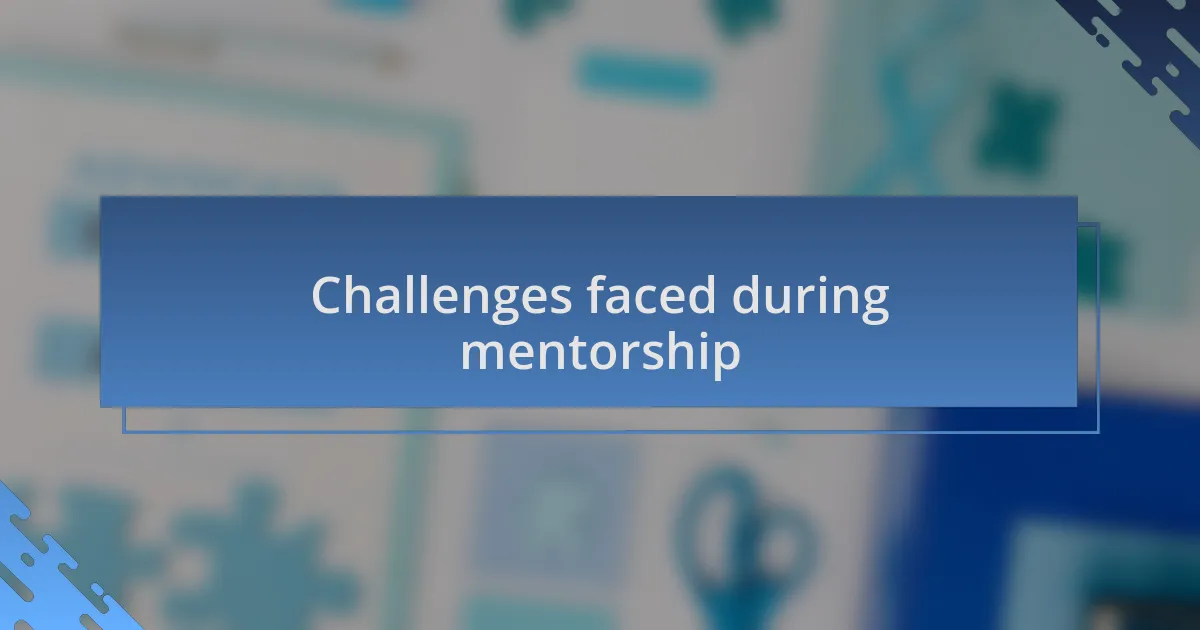
Challenges faced during mentorship
Mentorship can be incredibly rewarding, but it’s not without its hurdles. One of the challenges I faced was the mismatch of expectations between my mentor and me. I once anticipated a structured plan, but instead, I found a more fluid approach that left me feeling a bit lost at times. Have you ever been in a situation where the lack of clarity made you question your direction?
Another significant challenge was the emotional weight that came with sharing personal stories. I remember hesitating before opening up about my struggles with homelessness. It was daunting to expose vulnerabilities, but eventually, I realized that this raw honesty was necessary for growth. Have you found that confronting your fears often leads to profound breakthroughs?
Communication barriers also played a role in my mentorship journey. There were times when I felt hesitant to voice my thoughts or ask questions, fearing it would come off as naive. I learned that this silence was counterproductive. Ultimately, I discovered that asking for clarification helped not only me but also fostered a deeper connection. How do you navigate the complexities of communication in mentoring relationships?
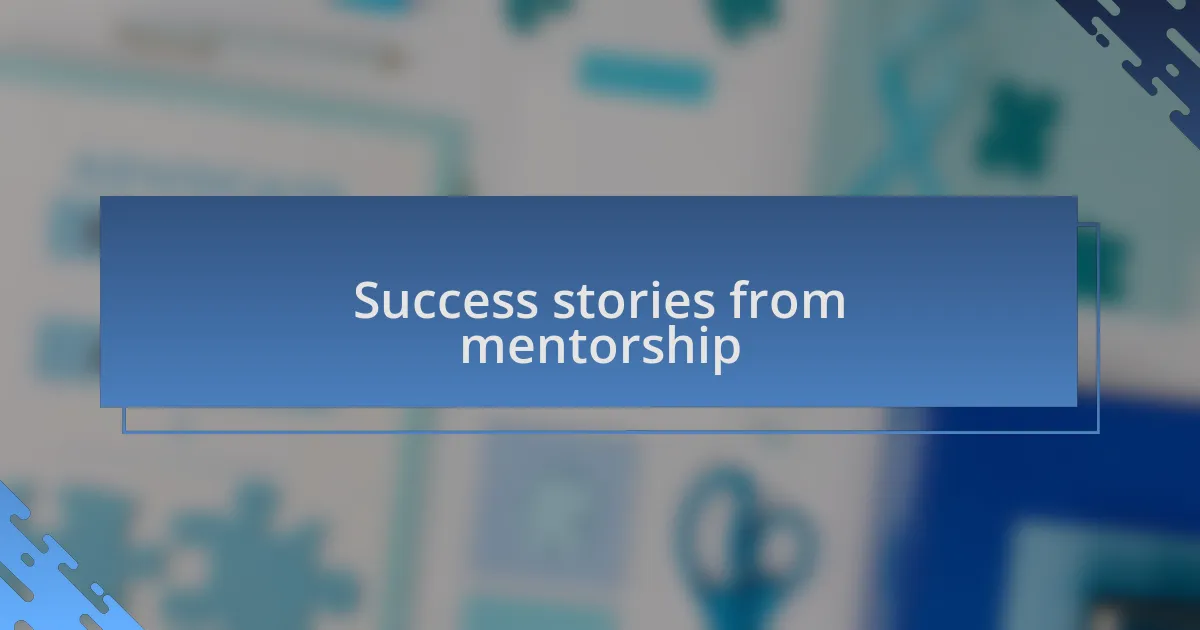
Success stories from mentorship
Success stories from mentorship often illuminate the paths we can take towards transformation. One particular instance comes to mind when I think about the individual I mentored, who had been grappling with the uncertainty of finding stable employment after facing homelessness. Through our sessions, we focused on refining his resume and practicing interview skills, which ultimately led to him landing a job that he now considers a turning point in his life. Isn’t it incredible how a few strategic conversations can shift someone’s entire trajectory?
Another heartfelt success story I cherish involved a young woman who struggled with self-confidence. During our mentoring process, we dedicated time to her personal growth, often integrating discussions about her past and how it shaped her self-image. Slowly, I witnessed her transformation; she began to take pride in her accomplishments, and eventually, she applied for a scholarship that she initially thought was out of reach. Isn’t it amazing how mentorship can help surface untapped potential?
One of the most rewarding endings in my mentorship journey was with a mentee who, initially afraid of failure, took the brave step to showcase her artwork publicly. It was a culmination of a long process where we tackled her fears together. When she finally held her first exhibit, the joy in her eyes was priceless. How often do we underestimate the impact of encouragement and belief from a mentor? These stories serve as a testament to the hope and possibilities that mentorship can create.